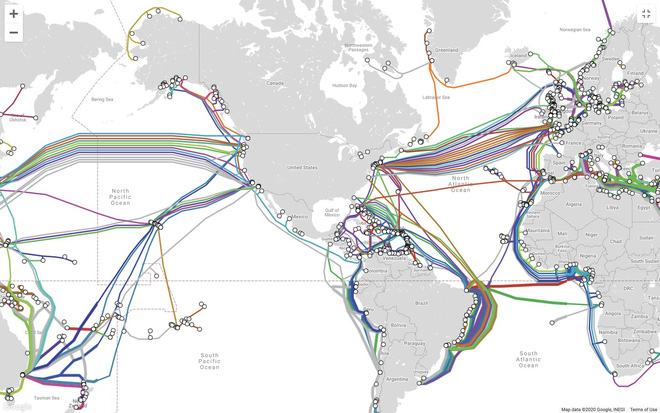Did the Covid-19 pandemic collapse the global Internet system? Professor Harvard answered
Undoubtedly, the move to work from home while the complicated Covid-19 (Coronavirus) pandemic is happening around the world is the best public health measure that anyone can offer.
However, there is a problem: When the world limits a lot of outdoor activities and most focus only on the screen of phones, tablets, laptops and desktops, the demand increases. about high-speed Internet speed that can crash the entire global network?
Computer science professor Jim Waldo - Chief Technology Officer of Harvard University (USA) - will explain this issue on Popular Mechanics , inviting readers to follow.
When you are picking up the phone to read these lines at home, your phone is connected to WiFi. But in large offices, to have Internet for desktop system, people need Ethernet cable (physical cable form) to connect devices together in local area network.
All hardware in the Workstation workstation (which is a powerful "supercomputer") can be logged in with its own MAC address; or can also be attached to an IP address based on its own Ethernet port.
For high performance of the Internet, businesses need tons of network bandwidth to maintain the maximum data rate on a stable path. However, for office workers and ordinary Internet users, online services for users such as Youtube, social networks, movies, games . are increasing, the demand for using the network with speed The height of the user just keeps increasing.

Map of underground cable systems on a global scale. Source: PRIMETRICA
Internet bandwidth is the maximum amount of data that can be transmitted (traversed) in 1 second between two computers through a network connection measured in Kilobit, Megabit or Gigabit units per second (abbreviated as Kbps , Mbps or Gbps).
All this bandwidth is transmitted by fiber optic networks (Internet type transmits by light signals). Transmission lines are fiber optic cables (can be made from fiberglass or plastic). In order for the world to be able to connect with each other on a global scale, users need to thank the system of more than 400 giant underground cables, located under the sea and lasting thousands of miles.
As mentioned at the beginning of the article, when the whole world is packed into the screens of phones and computers, will work at home collapse the Internet?
According to Professor of computer science Jim Waldo - Director of Technology of Harvard University (USA), working online at home is a change from company network to consumer devices.
"At Harvard, we have a fairly sophisticated network capable of coordinating data traffic within the school intranet. However, before the pandemic reality, everyone was studying and working. at home as it is now - and being "online at home" means that students and staff can go online "anywhere" in the world, from Boston (USA) to Asia - so this requires a much more complex route, as well as a more diverse device. The pressure to appear is obvious. "

Photo: Harvard University.
However, Professor Jim Waldo said, the ability to maintain and expand the Internet is a great thing and certainly needs and how users use this resource has stimulated the improvement of the Internet. For example, with Popular Mechanics , the homepage of Popular Mechanics is now 30 to 50 times larger than in the late 1990s, with high-resolution images and videos and significantly improved streaming speed.
Obviously, the higher the demand of users (in terms of network speed, high-resolution images .) has partly helped the Internet become stronger and faster.
However, every step of new online development, from simple things like multimedia to the ability to use programming languages, becomes a "burden", affecting the connection of others. Therefore, sometimes you will find your home network really lag .
Importantly, this is the point Professor Jim Waldo emphasizes, the Internet was created to handle all requests as quickly as possible; as well as being error resistant smoothly. Our data is transferred back and forth in a packet, and data loss (failure) is also part of a network designed to resist fault (Fault tolerance).
Simply put, if one server goes down, the user's requests are transferred to another server. Thanks to Fault tolerance, we are able to continue operating without interruption. Thanks to the automatic backup (backup) system, Fault tolerance can prevent interruptions and ensure continuity for users.

Instead of working in public, more people return home and work online more during the Covid-19 epidemic. Artwork: Internet
Back to the question, whether the Covid-19 pandemic will collapse the global Internet system, readers only need to recognize this problem:
In the US, nearly 7% of the people, almost all of whom give birth to a river in the countryside, use technology that provides WiFi via satellite. Nearly another 15% do not have official Internet access, they instead use mobile networks or public WiFi hotspots, or simply do not use it - the era of the Covid-19 epidemic has not yet happened.
In the present time, public places are forced to shut down, invisible "cut" out of high-speed Internet sources of many people.Businesses and their public WiFi systems are also closed.Children used to use computers at school, can now use them at home .
What does all this say?
Professor Jim Waldo only summed it up in a few words:The Covid-19 pandemic only caused users to switch places using the Internet largely from public places to home.
This means that Internet users only reduce Internet use in public places, and often stay at home using computers at home or look at the phone screen more often.
Therefore, there will be no data bandwidth threatened by the number of users increasing (because in fact, the number of users is still the same), so the answer to the question posed at the beginning of the article is: The Covid-19 pandemic is unlikely to bring down the global Internet system!
The Covid-19 pandemic is disturbing the lives of many people around the world.As of March 25, 2020, according to updatedWorldometer data, a total of 422,945 SARS-CoV-2 viruses worldwide have been reported to cause acute pneumonia.In particular, the number of deaths so far is 18,907 cases.
Posts using source: Popular Mechanics
You should read it
- ★ Official iOS 13.5: COVID-19 exposure detection, easier to unlock iPhone when wearing a mask
- ★ Program 55 billion to support businesses degraded by Covid-19
- ★ COVID-19 and Workers' Compensation: What the Law Says
- ★ These heartless scams take advantage of Covid-19 in China
- ★ A funny moment of Covid-19 season in Hue: Homemade robots from toy cars roam around providing relief for patients